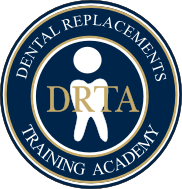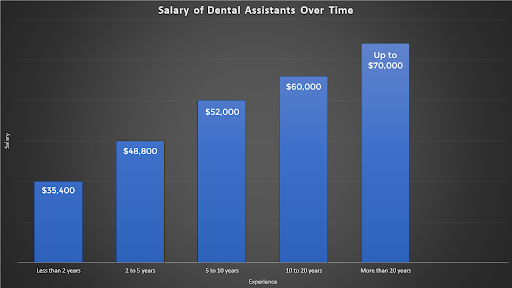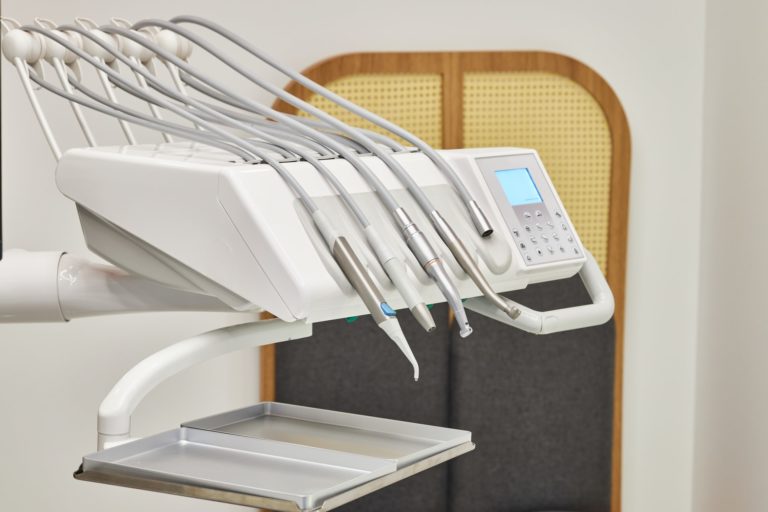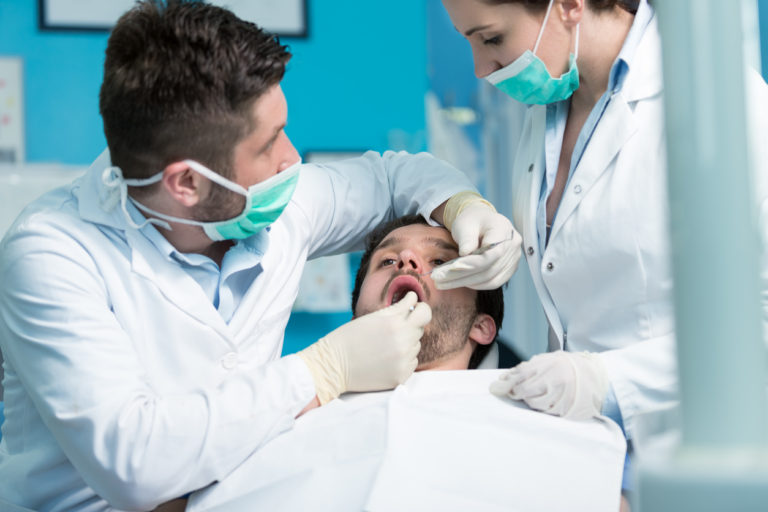Dental Assistant School Dallas
Dental Assistant Salary Dallas: Dental Assistant Specialties Part 2
This continued guide will cover the Dental Assistant Specialties including the expected dental assistant salary Dallas!
Click here if you missed Part 1 of the Dental Specialties series.
Seeking a career as a dental assistant in the Dallas area or Texas region but curious what that entails? Fortunately, there are many paths a Texas-certified dental assistant can take! A few of the most common dental assistant fields include:
Prosthodontic
Oral Surgery & Maxillofacial Surgery
Preventive Dentistry
Pediatric Dentistry
Orthodontic
Periodontal
Let’s take a dive into what specialties exist in the dental assistant world…
Prosthodontic Dental Assistant Outlook
Our fourth area of focus is prosthodontics. If you become a certified dental assistant in Dallas at our Dental Replacements Training Academy, you will be primed and ready for the additional work and certification testing required to enter a prosthodontics practice.
Prosthodontic dentistry is concerned with the replacement or substitution of oral components. Prosthodontic dentistry can range from restoring a single lost tooth to designing a complicated device to replace facial components like eyes, ears, or a cleft palate. The primary goal of prosthodontic therapy is to replace lost teeth with an artificial equivalent. Prosthodontic prostheses are replacements for natural teeth. Prosthodontic prostheses are either fixed or removable in the mouth of the patient.
Prosthodontic Dental Assistant Disciplines
Dentists in this discipline specialize in using dental implants, bridges, dentures, and crowns to replace damaged or missing teeth. Dentists require prosthodontic assistants who can build bite and mouth guards, custom trays, casts, diagnostic impressions, acrylic repairs, and prepare supplies for treatments, among other things.
To be an effective prosthodontic assistant, you need to be familiar with the following general information and basic skills. Your duties will include some of the following:
- Assisting the dentist in prosthodontic procedures
- Setting up prosthodontic instrument trays
- Preparing material for prostliodontic procedures
- Making diagnostic impressions and casts
- Trimming dental casts
- Fabricating mouth and bite guards and custom trays
- Performing simple acrylic repairs
Although a prosthodontist is a dentist who specializes in restoring lost teeth, many general dentists in your clinic will be able to give prosthodontic care. Your aiding responsibilities in prostliodontics are fairly similar to those in other disciplines. The sorts of treatments provided by the dentist, the materials you mix or manipulate, the devices the dentist employs, and the coordination necessary with dental laboratory employees are the main variations.
Prosthodontic Types:
Here are some of the prosthodontic types:
- A fixed prosthesis is any replacement for a lost tooth or portion of a tooth that is cemented in place and cannot be removed by the patient. Inlays, onlays, crowns, and fixed partial dentures are all examples of restorations. A fixed prosthesis can be made completely of porcelain, acrylic resin, or cast metal alloy. A fixed prosthesis is frequently composed of a mix of these materials. A full crown, for example, can include a metal base and a porcelain veneer (facing).
- An inlay is a dental restoration that fits into a prepared cavity and is held in place by a cementing substance and its precision fit. The majority of inlays are surrounded by healthy tooth structures. As a result, they’re commonly referred to as intracoronal restorations. The various types of inlays are typically utilized to restore the shapes and function of individual teeth. An inlay is not a suitable anchor casting (retainer) for a fixed partial denture in the majority of situations. Inlays are often constructed of medium-hard gold, however other materials can be used (porcelain, resin).
- Onlays are restorations made of cast gold, resin, or porcelain that cover the mesial, occlusal, and distal surfaces (MOD) of posterior teeth. In contrast to inlays, onlays cover the full occlusal surface of a tooth, including the cusps. The smallest of the fixed prosthetic restorations is an onlay.

Oral Surgery Assistant Outlook
Our fifth area of focus is oral and maxillofacial surgery. If you become a certified dental assistant in DRTA Dental Assistant School Dallas, you will be primed and ready for the additional work and certification testing required to enter a surgical dentistry practice. Earn your dental assistant salary Dallas!
Oral Surgery Assistant Responsibilities
Our fifth area of focus is oral and maxillofacial surgery. If you become a certified dental assistant in Dallas at our Dental Replacements Training Academy, you will be primed and ready for the additional work and certification testing required to enter a surgical dentistry practice.
An oral surgery assistant assists a dentist during surgery. As an oral surgery assistant, your job is to help the dentist prepare the patients and the operation room. You disinfect tools and arrange them, have a patient’s X-rays and paperwork on hand for the dental surgeon or periodontist, and prepare the patient by giving topical anesthetic and discussing the operation. You monitor anesthetic, assist with suction, and keep the patient’s mouth clean throughout oral surgery. You also keep track of the procedure and document it for the dentist.
To work as an oral surgery assistant, you must meet a variety of requirements. You can enroll in a post-secondary program to become a dental assistant after getting a high school diploma or GED certificate. Several programs are available at vocational schools and community colleges, including a one-year certificate program and a two-year associate degree program. Classroom and clinical training are also included. A license is required to administer anesthesia and operate with X-ray equipment. Certification, such as the Dental Anesthesia Assistant National Certification, which is for oral and maxillofacial surgical assistants, is also required for advancement in this field.
Oral Surgery Assistant vs Dental Assistant
The need for dental professionals is expected to expand dramatically in the future decade, according to the US Bureau of Labor Statistics. Oral surgery assistants are expected to expand 15% faster than the national rate through 2024, according to the Bureau of Labor Statistics. Much of this demand is driven by aging baby boomers who may require more dental care, necessitating the hiring of more dentists, surgeons, and assistants.
It’s not always easy to tell the difference between an oral surgery assistant and a dental assistant. Oral surgery assistants have undergone dental assistant training or programs and can serve as a dental assistant as necessary. The main distinction is that they have decided to specialize in oral surgery, which means they are responsible for specialized tasks such as preparing surgical settings and supporting the physician during treatments. Oral assistants often have a license to administer anesthesia and monitor IVs during surgery, whereas dental assistants do not. Dental assistants often assist during normal dental cleanings and exams, and unlike oral surgery assistants, they do not have extensive understanding of treatments such as implants, bone grafting, or specialist equipment.
Curious about your dental assistant salary Dallas?
Oral Surgery Assistant Workplace
Dental assistants focused on oral surgery care learn a wide range of techniques and equipment knowledge necessary to aid in the assistance of oral surgeons during operation, both pre- and post-op.
An oral surgeon’s office employs an oral surgery assistant. They often support an oral surgeon by helping them with preoperative planning for medical treatments, preoperative equipment preparation, preoperative patient preparation, postoperative care, and administrative tasks including arranging patient visits and keeping patient records.
The typical workplace for oral surgery assistants is a clinic, hospital, university, or government organization. To make sure the patients are comfortable, they work closely with them. Organizational, computer, listening, administration, attention to detail, and communication abilities are necessary for a successful oral surgery assistant.
Your responsibilities as an oral surgery assistant include getting patients and the operating room ready for the dentist. You prepare the patient by administering topical anesthetic and discussing the operation, disinfect the tools and arrange them in an orderly manner, and have the patient’s X-rays and chart available for the dental surgeon or periodontist. You keep the patient’s mouth clean, assist with suction, and monitor anesthetic during oral surgery. Additionally, you record the process for the dentist with remarks.

Oral Surgery Dental Assistant Salary Dallas
To work as an oral surgery assistant, you must meet a variety of requirements. To become a dental assistant, you can enroll in a post-secondary institution like ours dental assistant program in the Dallas area after receiving your high school diploma or GED. Numerous programs are offered by vocational schools and community colleges, including a one-year certificate program and a two-year associate degree program. Both contain both clinical training and classroom education. You must have a license in order to use X-ray machinery and provide anesthesia. The Dental Anesthesia Assistant National Credential, which is for assistants to oral and maxillofacial surgery, is one certification needed for advancement in this field.
The U.S. Bureau of Labor Statistics predicts that demand for dental professionals will increase dramatically during the next ten years. Oral surgery assistant employment growth is predicted by the BLS to increase by 15% through 2024, which is much more than the national average. Baby boomers are becoming older and may require more dental care, which increases demand for services from dentists, surgeons, and assistants.
It’s not always evident what distinguishes an oral surgery assistant from a dental assistant. When required, dental assistants who have completed dental assistant training or programs can also function as oral surgery assistants. The primary distinction is that they have made oral surgery their area of specialization, which entails that they have particular duties pertaining to setting up surgical settings and supporting the surgeon during treatments. Dental assistants are not permitted to monitor IVs or give anesthetic during surgery, although oral assistants sometimes have a license to do so. Unlike oral surgery assistants, who have extensive understanding of treatments including implants, bone grafting, and specialized equipment, dental assistants often assist during ordinary tooth cleanings and exams.
You could discover that working in various positions has prepared you for a career as an oral surgery assistant. In fact, many positions as an oral surgery assistant need prior experience as a position like dental assistant. Many assistants for oral surgery, however, also have prior work experience in positions like dental assistant.
Are You Considering Preventative Dentistry as a Dental Assistant?
Our sixth area of focus is preventative dentistry. If you become a certified dental assistant in Dallas at DRTA Dental Assistant School Dallas you will be primed and ready for the additional work and certification testing required to enter a dentistry practice focused on preventative care.
The Objective of Preventative Dentistry
Dental assistants focused on preventative care learn a wide range of techniques and equipment knowledge necessary to aid in the prevention of gum or tooth complications.
Helping patients form healthy dental habits is one of a dental assistant’s responsibilities. For patients who have poor dental habits, the dental assistant may be a potent incentive. Since the majority of patients have faith in professionals like dentists and dental assistants, they can have an impact on patients’ oral hygiene practices.
The effectiveness of a preventative dental program depends on the dental assistant reinforcing good oral hygiene. If the patient maintains good oral hygiene, the dental assistant should congratulate them. The dental assistant can encourage the patient to maintain proper oral hygiene by earning their confidence.
The objective of preventative dentistry should be to assist patients of all ages in maintaining good oral hygiene over the course of their life. To stop dental disease, the patient and dental assistant must collaborate. The patient must be informed about oral disease and how to avoid it by the dental assistant. The dental assistant’s job is to inspire patients to maintain proper oral hygiene without hesitation.
Dental Sealant and Preventative Strategy
Here are some of the areas of focus for a dental assistant in preventative dentistry:
Known as a dental sealant, a dental assistant will assist with the covering that covers the grooves and pits in a child’s teeth, which can help safeguard the teeth. Hard-to-clean tooth surfaces can be shielded from decay-causing germs with dental sealants. The American Dental Association has determined that dental sealants are secure.
Dental assistants must also assist in the overall preventative strategy. A person’s teeth develop as they age in addition to their baby teeth falling out and their permanent teeth coming in. The enamel cementation, dentin, and pulp of the teeth alter throughout time. According to the state of their teeth, the dental assistant is responsible for instructing patients of various ages about basic dental maintenance.
Adults are more prone than children to acquire caries at a higher rate. As an adult ages, caries can form in their roots, and their chances of developing gingivitis and gum recession rise. The elderly individuals may also have dry mouth due to drug usage, which might hasten tooth decay. To ensure that a patient’s teeth develop properly, a comprehensive preventative plan is essential.
Flouride, Sugar, Flossing, and Toothbrushes
Fluoride is a common topic when discussing preventative options for teeth. Mineral fluoride is found in water and food in naturally occurring amounts. Additionally, fluoride is added to tap water to help prevent cavities. The food we eat and the water we drink both contain systemic fluoride. Fluoride is given topically to the teeth with the use of mouthwash, toothpaste, and dental cleanings. The dental assistant should inform parents and adults about fluoride and its benefits in order to prevent patients from obtaining too much fluoride. Parents should be warned not to let small toddlers consume fluoride toothpaste by the dental assistant. Younger children should be watched by their parents while they learn how to clean their teeth so that they can develop good dental hygiene.
Sugar is another common discussion. It’s crucial to remember that dietary sugar is necessary for dental caries to develop, such as fructose, glucose, maltose, lactose, and sucrose. Artificial sweeteners can help prevent dental cavities, thus they are not just for diabetics to use. Aspartame, sorbitol, mannitol, and saccharine are examples of artificial sweeteners. It has been demonstrated that xylitol works to stop cavities before they start. According to one theory, xylitol prevents bacteria from using it to make acid, which prevents the development of the germs that cause tooth caries.
Dental assistants advise regular flossing since plaque takes 24 hours to form on the teeth. Unfortunately, even with regular brushing, flossing, and dental cleaning tools, a patient can’t get rid of all the plaque on their teeth every day. Patients are advised to have a dental hygienist clean their teeth at least once every six months. To adequately inform patients about all the possibilities for good oral hygiene, dental assistants must stay current on new dental products.
For toothbrushes, dental assistants should be knowledgeable in a wide range of brands, sizes, and textures. Electric and manual toothbrushes can be distinguished. Dental plaque can be removed using any kind. Soft-bristled brushes are often advised by dentists because they are kinder on the gums and any exposed cementum or dentin. Plaque should be removed by the toothbrush without inflicting any tissue harm.
Brushing, Plaque, Dentures, and Toothpaste
A dental assistant might suggest a standard technique for brushing. The toothbrush’s bristles should be directed away from the tooth’s surface at a 45 degree angle. The patient should be told to begin from the back of their mouth and move vibratorily back and forth. The dental assistant might offer this assistance as the patient brushes if they wish to show off their brushing expertise. The American Dental Association (ADA) advises using a toothbrush with soft bristles and brushing your teeth for two minutes, twice a day. Brushes should be changed every three to four months, according to recommendations. Sharing of toothbrushes is not advised. After each usage, the toothbrush has to be properly washed. After usage, the toothbrush should be placed in an upright position for storage so that it may air dry. It is important to avoid overbrushing in order to prevent excessive wear on the teeth, gum recession, and root exposure.
Given that it takes 24 hours for plaque to reattach to teeth after flossing, it is crucial to use dental floss once each day. By properly flossing, you can prevent bleeding gums by removing debris and bacterial plaque. It is advised that a patient flosses before brushing in order to remove plaque and prepare the tooth for fluoride treatment to prevent caries.
When a patient has dentures, the dental assistant will want to provide them instructions on how to properly clean them with a denture brush. The patient can clean their dentures with soap and water, professional denture cleaner, or gentle toothpaste. In order to prevent the dentures from breaking if they fall into the sink, the dental assistant should advise the patient to use brief strokes and to fill the sink with water.
Depending on the patient’s needs, there are several toothpaste alternatives. Fluoride to strengthen teeth and chemicals to eliminate food residue are required in all toothpastes with the ADA Seal of Acceptance. The patient may choose to have a certain toothpaste flavor, wish to get rid of stains, have sensitive teeth, need to lessen tartar buildup, whiten their teeth, or avoid bad breath. The dental assistant has a variety of options to suggest, which should be suited to the patient’s requirements.
Dental Assistant Salary
How Much Do Dental Assistants Make?
Reports place dental assisting as the 20–25 best healthcare support jobs. Over the past few years, the salary of dental assistants increased considerably. For instance, the median salary in 2017 was around $37,160. Today, it’s over $45,000.
According to the Bureau of Labor Statistics, around 64,600 jobs will be open between 2016 and 2026. That’s an employment growth of 19.5%.


How Do You Become a Dental Assistant in Texas?
As you may expect, becoming a dental assistant requires a degree. This is a medical practice that involves aiding in complicated procedures and optimizing office functions.
What’s the first step to becoming a registered dental assistant? Well, enrolling in one of the best dental assistant schools in Texas.
Our school, at Dental Replacements Training Academy, will ensure that you get a top-notch, personal, hands-on learning experience. You will learn all the necessary skills to excel in this field. You can also apply for online courses if you have a busy schedule. As we said earlier, you don’t have to leave your current job while training for a position in dental assisting.
Today, our online classes provide a high-quality teaching experience to let passionate people follow their dreams of joining the dentistry world.
Before you make this decision, however, let us cover the pros and cons of online dental assisting schools in Texas.
This concludes our two part series on the most common dental assistant specialties. As you can see, there are countless routes and focuses with which a dental assistant certificate from our DRTA Dental Assistant School Dallas in the comfortable suburb of Richardson, Texas, can assist with.
We would love to hear from you! Please reach out in our contact us area for more information on your future career as a dental assistant!
